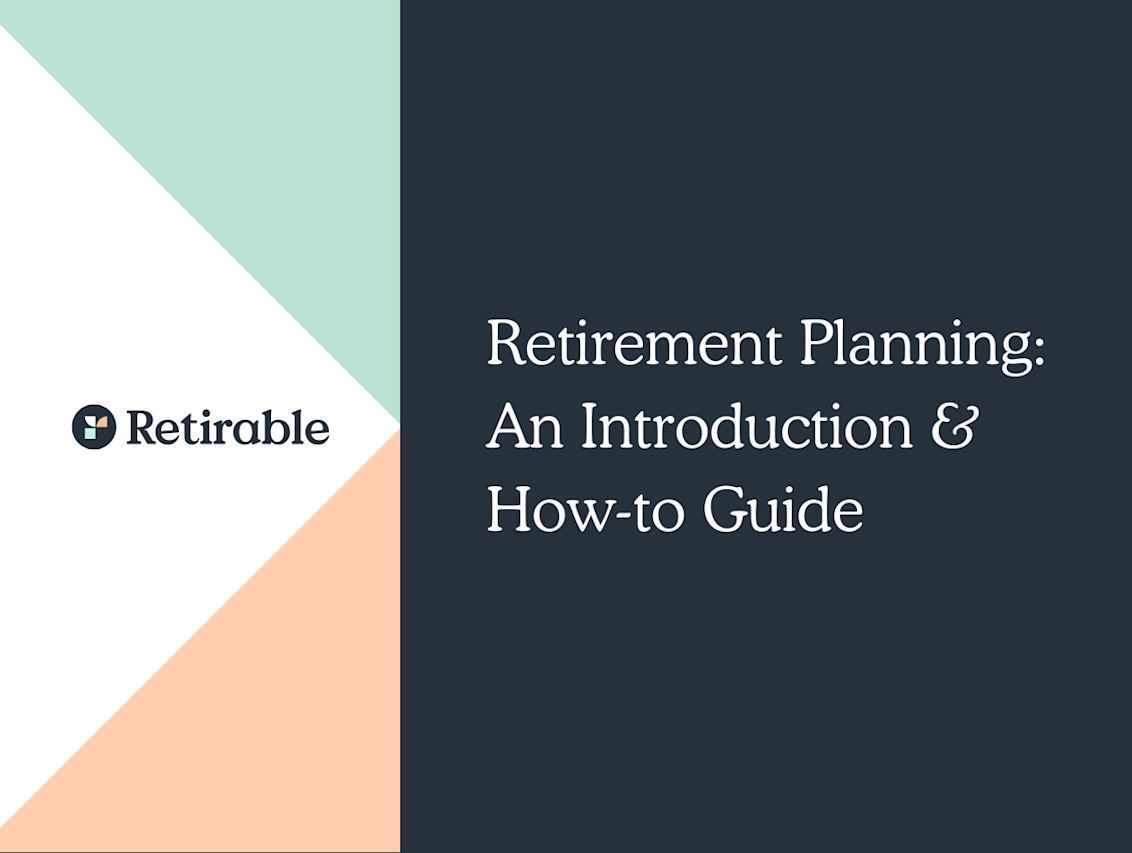Retirement Accounts
Don’t let worries about how much money you need to retire keep you up at night. By calculating based on your income, you can determine how much you need for retirement as well as an emergency savings fund at each major age milestone in your life.

C.E Larusso
•
Published May 25th, 2023
Table of Contents
Key Takeaways
A good general rule is to save 15% of your income each year towards your retirement, though if you can, more is always better
From age 25-45, you can afford to be riskier with your investments; after 50, it might be wise to rethink your allocation as you approach retirement
Waiting until you turn 70 to collect Social Security could get you 132% of your benefit amount
Don’t let worries about how much money you need to retire keep you up at night. By calculating based on your income, you can determine how much you need for retirement as well as an emergency savings fund at each major age milestone in your life. Saving for a comfortable retirement—the retirement you have always dreamed of—allows you freedom and won’t place the burden of your well-being on anyone else, like your children, siblings, or other extended family.
Why Saving for Retirement is Important
Eventually, not only will you not want to continue working, but you may not be physically able to do so. Saving for retirement ensures that you will have enough money to safely stop or reduce work while continuing your standard of living, and being able to afford healthcare, housing, and other essentials, as well as leisure activities.
In addition, you can’t rely exclusively on Social Security to get you through retirement. These benefits tend to replace about 40% of the average wage earner’s income in retirement, but financial advisors estimate that retirees usually need about 70% of their work income to get by.
Supplementing Social Security with your own retirement funds means you can spend retirement how you want to, whether that means traveling, taking up new hobbies, or moving somewhere quieter.
Calculating how much to save for retirement is important as it sets goalposts throughout your life so you know you’re on track and on time to save what you need to continue living a fulfilling and comfortable life even after work. Everyone’s situation is different, so while we’ll explore how much to save based on average incomes by age, you’re best off discussing your retirement plans with a dedicated Financial Advisor.
How Much Should I Have Saved By Age
This chart offers a breakdown of how much you might need to have saved by different ages throughout your life, though it follows the average worker’s salary (by age), according to the U.S. Census. It’s entirely possible that you will earn much more or much less than what is represented here, and that is how you should calculate your savings goals, alongside your spending habits.
| Age Group | Average Salary | Retirement Savings, Based on Average Salary | Emergency Savings Fund |
|---|---|---|---|
| 25-34 | $52,156 | $52,156-$78,234 | $25,000-$50,000 |
| 35-44 | $62,244 | $124,488-$186,732 | $53,000-$62,000 |
| 45-54 | $63,648 | $190,944-$254,592 | $90,000-$120,000 |
| 55-64 | $60,944 | $304,720-$365-664 | $120,000-$180,000 |
| 65+ | $51,532 | $515,320-$1,030,640 | $180,000+ |
How Much Savings Should I Have at 30
When you start your 30s, you might be settling into your career path, and finally landed a job with a decent (and steady) paycheck. This might also be when you consider those big picture decisions, such as life partnership and marriage, whether or not to become a parent, and which city or neighborhood you’d like to settle down for a while. You might also be putting away money for a mortgage or some other large expense. Obviously, everyone’s life is different, so your expenses may be very different from what is projected here, but this is a general guideline.
While you might not be thinking about retirement in your 20s, you should start saving for it as soon as possible. By age 25, but ideally earlier, consider putting 15% of your pretax income into your savings (including your company match, so if your company matches 5%, you should contribute 10%). At this point, you can opt for riskier investments, such as stocks, because you can shake off those short-term market fluctuations—you’ve still got 30 or 40 years until you retire. And of course, if you’re already at 30 and just reading this—it’s never too late to start saving.
And if you’re a higher earner or don’t have any debt to pay down, try to save 20% of your income. Using the 50/30/20 rule, you can divide your take-home pay into three categories: 50% for your needs, such as housing expenses and healthcare, 30% towards entertainment, travel, and dinners out, with the last 20% going to your savings.
Common Expenses: Rent/housing, food, student loan debt, credit card debt, food/groceries, car payment, entertainment (including subscriptions like Netflix)
Average Income: $47,736
Retirement Savings Goal: $47,000, or one year of your average income
Emergency Savings Goal: 3-6 months worth of expenses
How Much Savings Should I Have at 35
By age 35, you should have between 1.5x and 2x your annual income saved for retirement. If you still have credit card or student debt, it’s a good time to try and pay it all off, and once you have, re-allocate the amount you would have used for those bills to your savings accounts.
At this point, you’ll need a larger emergency savings, as you might have a spouse or family to care for on top of yourself, in case you lose your job or there is an unexpected expense. If you haven’t been contributing to your retirement savings, you’ll need to play catch up for time lost and contribute a higher amount of your take-home pay. While we normally suggest ~15% of your income, if you haven’t saved between 1.5x and 2x your income, you might need to save 25% or more each year.
Common Expenses: Mortgage/housing, utilities, new baby/family expenses, business (starting your own or professional development for your career), remaining student and credit card debt
Average Income: $53,000
Retirement Savings Goal: 1.5x-2x of average income, so roughly $75,000-$105,000.
Emergency Savings Goal: 6-12 months worth of expenses
How Much Savings Should I Have at 40
Gen Xers and Millennials may find themselves off-track for this goal, given higher student debt and challenging economic situations—some of which were unprecedented—like the COVID-19 pandemic. In addition, those who live in costly metropolises like San Francisco or New York City may struggle to find affordable housing, and might not be homeowners.
If you’re not quite at the guideline goal of $175,000, don’t fret. There’s a few ways you can try and boost your savings to make up for lost time or returns. You might start by asking for a raise; most people don’t research the average salary for their roles and are being underpaid—check Glassdoor and Payscale to make sure you’re making what you’re worth. You could also take on a side job to make a little extra to save.
Finally, this is a good time to consider a Roth IRA, versus a traditional IRA. Roth IRAs allow for tax-free withdrawals when you retire, which can help you recover from any lost years of savings contributions. At this point, you should have a dedicated Financial Advisor to discuss your retirement goals and know your path to getting there.
Common Expenses: Mortgage/housing, utilities, transportation,
Average Income: $60,000
Retirement Savings Goal: 2-3x your income, so based on the US average, $120,000-$180,000
Emergency Savings Goal: 12 months+
How Much Savings Should I Have at 45
Ideally, you are comfortable in your career, know your worth, and know how to ask for a raise to boost your income as much as possible. At 45, you have likely reached your peak earnings, so this is a good baseline to calculate your income and expenses for the rest of your life and retirement. At this point, retirement seems less abstract, and more like something you’re seriously prepping for, so it’s a good idea to start thinking about where you might want to live after you stop working and how you will spend your time and money.
If you have kids, you should consider starting a 529 plan to help pay for the college tuition. That said, don’t contribute so much to that plan that your goal of 15% savings for retirement takes a hit—that should be your priority, especially as you’re getting older. Remember that your kids will have other ways to pay for college, such as work-study programs, federal aid, and scholarships.
Common Expenses: Housing, utilities, food, transportation, healthcare, childcare/college savings
Average Income: $63,000
Retirement Savings Goal: 4x your income, so based on the US average, $252,000
Emergency Savings Goal: 18-24 months
How Much Savings Should I Have at 50
Reaching age 50 is a major milestone, and worth celebrating. Hopefully, you’re excelling in your career, have comfortable housing in a place you love to live in, and are looking ahead to retirement. It’s possible, though, that there could be various expenses putting a small dent in your savings, such as supporting your kids through college, medical issues, or random life emergencies, such as a sudden natural disaster. How you can weather these sorts of storms depends on how much you’ve put away earlier in life, though there are still lots of ways to play catch-up.
Make sure to teach your kids the value of saving and spending wisely, and encourage them to earn their own money so your own savings doesn’t have to compensate so much.
You should also open an HSA, or Healthcare Savings Account. The amount in your HSA can be invested and will grow tax-free until you reach retirement; at age 65, you can take withdrawals for qualified medical expenses without paying penalties or taxes. This will help you prepare for any higher medical expenses as you age.
Finally, once you hit 50, you can add an extra $7,500 to your 401(k) contribution limit, for a total of $30,000 per year. If you can afford it, try and contribute up to the max. Traditional and Roth IRAs also allow an extra $1,000 per year after age 50, for $7,500 versus $6,500 for those under 50.
At this point, you might also consider moving some of your savings into less risky investments (some experts recommend about 50-60%).
Common Expenses: Mortgage/housing, utilities, transportation, healthcare, insurance, taxes, kids’ college expenses Average Income: $63,000 Retirement Savings Goal: 5-6x your income, or $315,000 to $378,000, based on the average Emergency Savings Goal: 24-36 months
How Much Savings Should I Have at 60
At 60, your retirement could be right around the corner, if you’ve saved enough and feel mentally ready for it. Some people will of course choose to delay past 62 (and there are financial benefits to doing so), but the choice is yours and should be made based on your health, ability and willingness to keep working, and financial situation.
In your early 60s, your spending won’t drop very much. Most research shows that it doesn’t decline by more than 10%, so be prepared for that, and try to plan how much you will need after you turn 62; this can help you determine whether or not you should start collecting your Social Security benefits.
While you can start collecting Social Security at age 62, you will permanently reduce your benefits; each month you delay collecting, however, until you reach age 70, will grant you a larger benefit. If you are in good health at age 60, it might be wise to delay collecting Social Security so you can maximize the payout.
If you think there will be a gap in how much you’ve saved versus how much you’ll need, now is the time to significantly reduce spending and put additional funds in your 401(k) or IRA accounts.
Common Expenses: Mortgage/housing, food, utilities, healthcare, taxes, transportation
Average Income: $60,000
Savings Goal: 7-8x your income, or $420,000-$480,000
Emergency Savings Goal: 36-48 months
How Much Savings Should I Have at 70+
If you were able to wait until age 70 to start collecting Social Security benefits, you’ll receive 132% of your benefit amount, which is a big bonus. Continuing to work until you turn 70 also means you will be able to max out your 401(k) for additional years and get extra employer match contributions.
At 73, you’ll need to start taking required minimum distributions (RMDs) or Roth 401(k), so you can decide between 70 and 73 if you’d like to turn your traditional IRA into a Roth account—this will mean you will might have a high tax bill when you change the accounts, as you need to pay taxes on traditional IRA earnings, but distributions from the Roth IRA will be tax-free.
All that said, at this point in your life, it is common for some of your expenses to go down a bit. You might have fully paid off your house. If you have kids, they may be grown and supporting themselves. In addition, if you’re no longer working, you won’t be commuting to an office every day.
Common Expenses: Food, utilities, healthcare, taxes, leisure activities such as travel
Average Income: $51,000
Retirement Savings Goal: 10-20x your income, or $500,000-$1,000,000, based on the average
Emergency Savings Goal: 60 months or more
Frequently Asked Questions
What options do I have if I don't have enough saved for retirement?
If you’ve done a review of your finances only to discover you’re falling short on your retirement savings, you might consider bumping up your 401(k) contributions if you’re eligible. In addition, open a traditional or Roth IRA, and start making contributions there as well.
This should go hand-in-hand with a full budget review to see where you can cut back on spending and save more for retirement. If you go out to dinner twice a week, try cutting that back to once per week and stash that $100 in your savings.
Often, people choose to sell their homes and downsize to generate more income for retirement, so this could be another option to consider.
Should you adopt a savings mentality for retirement?
Given recent inflation, the dollar just isn’t going as far as it used to—which is why you should keep a close eye on every dollar that leaves your banking account and where it goes. Keeping a budget is a smart way to make sure you aren’t spending money that could be going towards your savings. Saving money doesn't mean putting $500 into your IRA each month (though that’s great!); $10 per week is a perfectly fine goal if that’s all you have at the moment. Once you adapt to the savings mindset, you can begin to look for additional ways to increase your income to save even more.
At what age should I start to decumulate my wealth?
The process of decumulation is a tricky one, and should be plotted given your savings and preferred lifestyle, as well as which activities you have planned for your later years (a trip to Antarctica will cost much different from a vegetable garden, for instance). There’s no right answer for everyone, but most Americans wait until they are age 60 to decumulate their wealth, as this is when they can start withdrawing from tax-advantaged accounts tax-free. Others wait until Social Security benefits kick in, which could be between 62-70.
Share this advice

A professional content writer, C.E. Larusso has written about all things home, finance, family, and wellness for a variety of publications, including Angi, HomeLight, Noodle, and Mimi. She is based in Los Angeles.
Share this advice

A professional content writer, C.E. Larusso has written about all things home, finance, family, and wellness for a variety of publications, including Angi, HomeLight, Noodle, and Mimi. She is based in Los Angeles.
Free Retirement Consultation
Still have questions about how to properly plan for retirement? Speak with a licensed fiduciary for free.






